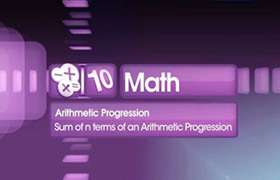CBSE Class 10 Answered
Q1.If the pth term of an AP is equal to q and qth term is equal to p.Then prove that the nth term is p+q-1.
Asked by Ravi consul | 01 May, 2012, 09:37: PM
Let the first term and common difference of the given A.P. be a and d respectively.
Given : p th term = q? a + (p 1) d = q ..... (1)
and g th term = p
? a + (q 1) d = p ...... (2)
Subtracting (2) term (1), we get
(p q)d = (q p)
d = 1
Putting d = 1 in equation (1), we get
a + (p 1) ( 1) = q
? a = p + q 1
? n th term = a + (n 1) d = (p + q 1) + (n 1) ( 1)
= p + q 1 n + 1 = p + q n
? n th term of the given A. P. is (p + q n)
Answered by | 02 May, 2012, 09:53: AM
Application Videos
Concept Videos
CBSE 10 - Maths
Asked by purbashadebnath1980 | 09 Mar, 2024, 12:10: PM
CBSE 10 - Maths
Asked by deepikaselvam2009 | 20 Feb, 2024, 08:57: PM
CBSE 10 - Maths
Asked by keshavsinghalhapur | 16 Jan, 2024, 08:46: PM
CBSE 10 - Maths
Asked by keshavsinghalhapur | 15 Jan, 2024, 10:56: AM
CBSE 10 - Maths
Asked by durgauikey7000 | 08 Dec, 2023, 08:16: PM
CBSE 10 - Maths
Asked by skandachiranjeevin | 06 Dec, 2023, 07:08: PM
CBSE 10 - Maths
Asked by shaikhyakub9946 | 30 Nov, 2023, 11:50: AM
CBSE 10 - Maths
Asked by prassanna.j | 13 Nov, 2023, 11:24: PM
CBSE 10 - Maths
Asked by prassanna.j | 13 Nov, 2023, 11:23: PM
CBSE 10 - Maths
Asked by latayadav23 | 17 Oct, 2023, 08:39: PM











